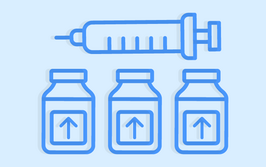The Monoclonal Milestone
The launch of the world’s first biosimilar monoclonal antibody was a big step forward from a regulatory and scientific standpoint. Will there be enough room at the table?
The market size for monoclonal antibodies (mAbs) is huge. Over the past 10-15 years mAb medicines have become a cornerstone of treatment for chronic and life-threatening diseases, such as rheumatoid arthritis and cancer. Looking at the top ten bestselling medicines worldwide, seven are biologics and five of those are mAbs. There is no doubt that mAbs are highly important drugs that have provided new options for some major unmet medical needs. But they are also very expensive medicines in many cases, which has a significant impact on healthcare costs.
The scale of the market makes last year’s European approval of two biosimilar versions of infliximab a real milestone for the biologics industry. Biosimilars typically deliver savings of 20-30 percent – money that could be used to fund further innovation. Of course, we’re dealing with large, complex molecules with multiple mechanisms of action, so prices aren’t going to match those of small molecule generics. But as more biosimilars emerge over the next couple of years, we can expect to see costs fall further as regulatory and scientific confidence grows. My hope is that reduced costs will not only benefit overstretched healthcare systems here in Europe, but also make these drugs more accessible to the emerging and unregulated markets – that is to say, the remaining 85 percent of the world’s population...
The big question is, which kind of companies will come out on top as the market expands? In the late 1990s and early 2000s, big generics companies were the trailblazers in the biosimilar space. But in 2010, when President Obama signed the Patient Protection and Affordable Care Act and the biosimilar regulatory pathway opened up in the US, everyone wanted to jump on the bandwagon, with big pharma and even small biotechs getting in on the action. Most big pharma companies have a generics arm and see this as a strategy for growth and differentiation – after all, if you can’t beat them; join them. Large generics companies, seeing that the small molecule market has slowed in recent years, see difficult-to-make generics like biosimilars, small-volume injectables and inhalable drugs as a way of setting themselves apart from smaller competitors who lack the extensive know-how, investment and capacity required. Given an estimated cost of €70-100 million, there are few smaller companies who can take a biosimilar all the way from development to market. Instead, biotechs will generally develop biosimilar molecules up to Phase I, before passing them on to a bigger company to commercialize. We have seen some new biotech companies being launched over the last few years by ‘veterans’ of the field, who were involved either with the development of originator molecules or with the first biosimilars. In my view, there is room for all parties at the table; bigger generics and pharma companies will bring biosimilars to market, with some of the earlier work being performed by smaller biotech companies.
One positive side effect of the growth in biosimilars is that it presents a great opportunity for the European pharma industry. In the first half of the last century, Europe was the pharmacy of the world. But in the 1980s and 1990s, low-cost manufacturing in Asia and greater availability of venture capital funding in the US eroded that position. Now that these blockbuster biologics are coming off-patent, a significant market has opened up again – everyone who has the know-how and resources can develop high-quality versions of these products. Europe even has something of a head start, as the US has been slower to implement a regulatory pathway for biosimilars. That said, the US is catching up fast, and the next highly anticipated milestone in the biosimilars industry – the first FDA approval – is potentially just months away.
Carsten Brockmeyer is CEO of Formycon AG in Martinsried, Germany.



















